Cat Nose Scab: How to Deal with Black Scabs on Cats
Introduction
As a devoted cat owner, it’s essential to pay close attention to your feline friend’s health and well-being. One common issue that cat owners may encounter is the presence of black scabs on their cat’s nose. These scabs can be a cause of concern and may require prompt attention. In this article, we will explore the reasons behind cat nose scabs and discuss effective ways to deal with them, ensuring your feline companion stays healthy and comfortable.
Understanding Cat Nose Scabs
Cat nose scabs are dry, crusty, and sometimes dark-colored patches that form on a cat’s nose. They can be alarming to discover, but they are often indicative of an underlying issue rather than a condition on their own. These scabs can vary in size and appearance, and they may or may not cause discomfort to your cat.
Common Causes of Cat Nose Scabs
Several factors can contribute to the development of black scabs on a cat’s nose. Understanding these causes can help you address the root of the problem effectively.
3.1. Allergies
Allergies to certain foods, environmental factors, or substances can lead to skin irritations and scabs on your cat’s nose.
3.2. Infections
Bacterial or fungal infections in the nasal area can result in scab formation. These infections may occur due to injuries or compromised immune systems.
3.3. Injuries
Accidents or fights can lead to minor injuries on your cat’s nose, which can scab over as they heal.
3.4. Skin Conditions
Certain skin conditions, such as feline acne or dermatitis, may manifest as scabs on the nose.
Recognizing Black Scabs on Cats’ Noses
Identifying black scabs on your cat’s nose is crucial for timely intervention. Regularly inspect your cat’s face during grooming sessions to spot any abnormalities.
Is It Serious?
While black scabs on a cat’s nose may not always be an emergency, they should not be ignored. In some cases, they can indicate underlying health issues that need attention.
Steps to Deal with Cat Nose Scabs
If you notice black scabs on your cat’s nose, here are some steps you can take to address the situation:
6.1. Observe and Monitor
Monitor your cat’s behavior and overall health. If the scabs are small and not causing any discomfort, you can observe them closely for changes.
6.2. Keep the Area Clean
Gently clean your cat’s nose with a soft, damp cloth to remove any dirt or debris that could worsen the condition.
6.3. Avoid Picking or Scratching
Resist the temptation to pick or scratch off the scabs, as this can lead to further irritation and possible infections.
6.4. Use Topical Treatments
Consult your veterinarian and inquire about safe topical treatments to promote healing and alleviate any discomfort.
6.5. Consult a Veterinarian
If the scabs are persistent, seem to be getting worse, or are accompanied by other concerning symptoms, it’s best to seek professional veterinary care.
Prevention of Cat Nose Scabs
Taking preventative measures can reduce the likelihood of your cat developing nose scabs in the future:
7.1. Regular Grooming
Regular grooming can help prevent the buildup of dirt and bacteria on your cat’s nose.
7.2. Maintain a Healthy Diet
Ensure your cat’s diet is well-balanced and meets all their nutritional needs to support a strong immune system.
7.3. Minimize Allergens
Identify and minimize potential allergens in your cat’s environment to reduce the risk of allergic reactions.
7.4. Keep Indoor Environment Safe
Creating a safe indoor environment can prevent accidents and injuries that may lead to scabs.
Home Remedies for Cat Nose Scabs
In addition to professional veterinary care, you can try these home remedies to aid the healing process:
8.1. Coconut Oil
Apply a small amount of coconut oil to the scabs to soothe the affected area.
8.2. Aloe Vera Gel
Aloe vera gel has natural healing properties that can help with skin irritations.
8.3. Chamomile Tea Compress
A chamomile tea compress can provide relief and promote healing when applied gently to the scabs.
When to Seek Immediate Veterinary Care
Certain signs indicate that immediate veterinary care is necessary:
- Rapidly worsening scabs
- Bleeding or discharge from the nose
- Loss of appetite
- Lethargy and unusual behavior
If you notice any of these signs, don’t hesitate to contact your veterinarian.
Conclusion
Cat nose scabs can be a cause for concern, but with prompt attention and proper care, they can be managed effectively. Regular observation, a clean environment, and a healthy diet are essential aspects of cat care that can contribute to preventing nose scabs. However, always remember that professional veterinary advice is invaluable when it comes to your cat’s health.
FAQs
1. Can I use over-the-counter ointments on my cat’s nose scabs? It is not recommended to use over-the-counter products without consulting your veterinarian, as some ingredients can be harmful to cats.
2. Are cat nose scabs contagious to other animals? In most cases, cat nose scabs are not contagious to other animals, but it’s best to monitor interactions to be safe.
3. Should I be worried if the scabs fall off on their own? If the scabs fall off naturally and the skin underneath looks healthy, it is generally a positive sign. However, keep an eye on your cat’s behavior and health.
4. Can stress cause cat nose scabs? Stress can contribute to certain health issues in cats, including skin conditions, so reducing stress levels can be beneficial.
5. Is feline acne the same as cat nose scabs? Feline acne is a specific condition that affects the chin area, while cat nose scabs can have various causes, including acne, but are not limited to it.




